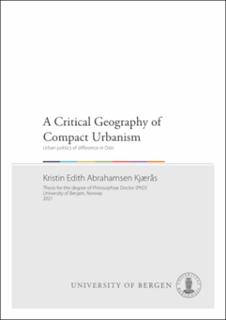| dc.contributor.author | Kjærås, Kristin Edith Abrahamsen | |
| dc.date.accessioned | 2021-11-05T07:15:39Z | |
| dc.date.available | 2021-11-05T07:15:39Z | |
| dc.date.issued | 2021-11-16 | |
| dc.date.submitted | 2021-10-20T12:11:09.172Z | |
| dc.identifier | container/2b/08/86/ce/2b0886ce-d10a-44f3-ada7-b48517466f8d | |
| dc.identifier.isbn | 9788230855003 | |
| dc.identifier.isbn | 9788230858462 | |
| dc.identifier.uri | https://hdl.handle.net/11250/2828042 | |
| dc.description.abstract | Since the 1990s urban sustainability has become a prominent international policymaking goal and global policy discourses have encouraged people to live in cities. Compact city policies have proliferated during this period. Positioned against urban sprawl and the expansion of suburban low-density development, compact city policy has been defined as a comprehensive urban development approach aimed for concentrating and optimising human settlements. While ongoing debates question the environmental, economic and social sustainability of compact urbanism, cities globally increasingly adopt a broad variety of compact city approaches. Urban density is commonly viewed positively in economic, ecological and social terms. In Oslo—the research context of this study—compact urbanism makes up the overarching land use strategy and is viewed as a successful policy for curbing sprawl and encouraging sustainable transportation. However, a broad literature shows that compact urbanisation also contributes to a considerable portion of global energy use and corresponds with increases in inequality. This thesis makes the case that compact city policies should be viewed in light of these complex trajectories of urban life and development.
To develop what I term a critical geography of compact urbanism I carried out a multi-sited case study on how urban actors seek to forge alternative regulations, practices and alliances that might enable more sustainable trajectories in Oslo. I am particularly interested in understanding how policies and practices from elsewhere influence urban actors’ attempts to diverge from established development trajectories. If there are alternative trajectories for compact urbanism, how are they translated, learned and legitimised?
To understand the form of urban learning that influences societal shifts—what I have termed, how cities learn difference—I have critically engaged with how urban actors attempt to rearticulate hegemonic strategies in more sustainable directions. Engaging theories that understand difference as affirmative, contingent and relational has allowed for a research project focusing on how alternating stories of compact urbanism in Oslo are made apparent, coherent and subversive. My research shows that there exists a range of counterhegemonic trajectories of urban development, and examples of urban practices and discourses that challenge the hegemonic manifestation of compact urbanism in Oslo. Shifting towards a relational perspective of the compact city allows not only another compact urbanism to be perceived as possible, but shows that coeval trajectories of compact urbanism are already present in fragmented ways throughout different cities. Understanding alternative trajectories of compact urbanism in Oslo as relational, context-contingent and unpredictable endeavours, my research emphasises topologies of difference to which alternative trajectories of compact urbanism aspire. | en_US |
| dc.language.iso | eng | en_US |
| dc.publisher | The University of Bergen | en_US |
| dc.relation.haspart | Paper I: Kjaras, K. (2021). Towards a relational conception of the compact city. Urban Studies 58(6): 1176-1192. The article is available at: <a href="https://hdl.handle.net/11250/2765830" target="blank">https://hdl.handle.net/11250/2765830</a> | en_US |
| dc.relation.haspart | Paper II: Kjaras, K. Learning urban density: The politics of urban densification in Oslo.Not available in BORA | en_US |
| dc.relation.haspart | Paper III: Kjaras, K. and Haarstad, H. A geography of repoliticisation: Popularising alternative housing models in Oslo. Not available in BORA | en_US |
| dc.relation.haspart | Paper IV: Schrage, J. and Kjaras, K. How do cities challenge patterns of demand? Characterising the local governance of climate change in Nordic cities. Not available in BORA | en_US |
| dc.relation.haspart | Paper V: Haarstad, H., Kjaras, K., Roe, P. G. and Tveiten, K. Diversifying the compact city: A renewed agenda for geographical research. Not available in BORA | en_US |
| dc.rights | In copyright | |
| dc.rights.uri | http://rightsstatements.org/page/InC/1.0/ | |
| dc.title | A Critical Geography of Compact Urbanism : Urban politics of difference in Oslo | en_US |
| dc.type | Doctoral thesis | en_US |
| dc.date.updated | 2021-10-20T12:11:09.172Z | |
| dc.rights.holder | Copyright the Author. All rights reserved | en_US |
| dc.contributor.orcid | https://orcid.org/0000-0001-8714-7125 | |
| dc.description.degree | Doktorgradsavhandling | |
| fs.unitcode | 15-41-0 | |
